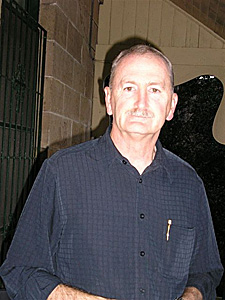The Rev Pat Collins has been the rector of Christ Church, Lavender Bay since February this year and things are going well.
But rewind to 2001 and things weren't so good.
Pat entered full-time ministry in 1986 and by 1989 was leading his own church as curate in charge and then rector of Cambridge Park from 1989 to 1995.
"Cambridge Park was a great place to minister and we saw 200 per cent growth in our time there," Pat says.
"But keeping up with growth, while much more fun and encouraging than non-growth, will still drain you if you are not sensible."
Pat admits he was already weary after six years of looking after a parish with five churches and eight services, so he was probably not in the best condition upon commencing as rector of St Anne's, Ryde in late 1995.
 "The people at Ryde were lovely but previous circumstances there meant that extra work had to go into restoring faith in ministry and healing some hurts," Pat says.
"The people at Ryde were lovely but previous circumstances there meant that extra work had to go into restoring faith in ministry and healing some hurts," Pat says.
Pat managed the completion of a longstanding church building project while at the same time developing and maintaining a sense of unity and trust within the congregation.
At the completion of the building project in 2002 Pat says there was a great sense of unity and expectation within the congregation and a positive feeling about itself, its future and leadership.
However, Pat had been on antidepressants for the past 12 months and was seeing a counsellor.
"I found that generally my confidence level in most areas diminished as I was aware what hitting the wall felt like. You can’t just work your way out of it, which my sort of personality tries to do," Pat says.
"I was shy of taking up new commitments and took some time to feel "complete' again."
Escaping burnout
 After praying during a break in October 2002, Pat felt God was "releasing' him from his role as rector of St Anne's.
After praying during a break in October 2002, Pat felt God was "releasing' him from his role as rector of St Anne's.
"While I could see that it was time to move on there was not sufficient energy to do justice to a new parish," he says.
Having taught for 10 years prior to entering Bible college, Pat was able to get a job as a Primary teacher at Penrith Anglican College (PAC). He finished his role as rector of St Anne's in January 2003 and taught at PAC from January 2003 to December 2006.
Pat and his wife Sharon attended MBM at Rooty Hill as parishioners where he also served on Parish Council, ran a Bible study and took occasional 8am services for rector, Ray Galea.
"My family were happy to see me do something different as they were aware of what was happening to me. We were also to spend more time together," Pat says.
Pat re-entered parish ministry in February 2007, becoming rector of Christ Church, Lavender Bay.
Pat says he and Sharon are happy to be back in paid ministry again, but admits he is still confronted by many of the same pressures as before.
"I still get very impatient and being a reformed workaholic can be the cause of more frustration," Pat admits.
"I am wary of overstretching and learnt that I can’t always trust my judgment on when I'm doing too much. I have to work out how to listen to my wife and others on this issue."
Most of all, Pat stresses the importance of fully relying on God.
"Pray more and let God take more of the load. It is what he does, with or without you, that will last. Also, realise that impatience is not always enthusiasm but sometimes just sin."
Bishop Brain on burnout
Bishop of Armidale Peter Brain has been in ministry for over 33 years and seen all the tell tale signs of burnout in clergy. Discouragement, lack of fulfilment and drawing away from people are the worst signs he has observed.
"Ministers want to minister to people but if they aren't on guard against burnout, they can get to a stage where they can't do it anymore. The worst think about burnout is you are not doing what you want and ought to be doing," Bishop Brain says.
"The good news about burnout is once you recognise the signs you can take remedial action to avoid it. Recognising the symptoms is like observing the warning light on a car dashboard " the sooner you realise something is wrong and fix it, the less damage is done."
Bishop Brain says people should not feel guilty or like failures if they experience burnout.
"It's inevitable if you work with people and want to work hard at it. The trick is to recognise when you aren't achieving and to pull back and rest rather than upping the work load," he says.
Bishop Brain can even speak from personal experience of suffering burnout symptoms while ministering in Perth.
"I remember driving around visiting people and at one point I could not get out of car. At that point, I knew something was wrong," he says.
"All it took was some wise advice from church wardens and my wife who advised mw to keep working during the day but to have every night off for two weeks."
Bishop Brain suggests building regular breaks into one's daily, weekly and annual program to avoid burnout. He also suggests regular, sustained exercise at least three times a week and meeting with a trusted friend once a fortnight to share your life is essential. Most importantly, he says people must take their days off and make time to pray and read the Bible.
"People who don't take days off are prime candidates for burnout. Apart from being disobedient to God, it is foolish and it catches up with you," Bishop Brain says.




















